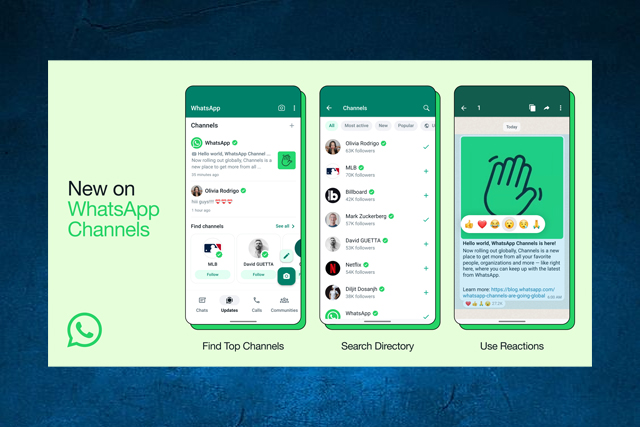WhatsApp, the Meta-owned messaging platform, continues to redefine its capabilities, evolving from a simple messaging app into a multifaceted social media powerhouse. In its latest move, WhatsApp by Meta has introduced ‘WhatsApp Channels,’ a feature that allows for one-way communication with a global reach. This article explores the impact of WhatsApp Channels on celebrities, brands, and influencers, as the platform expands its horizons in 150 countries.
WhatsApp Channels
Meta has unveiled ‘WhatsApp Channels,’ a feature that enables private updates from various entities, including organisations, sports teams, brands, artists, and thought leaders. Initially launched in Colombia and Singapore in June 2023, this feature is currently accessible exclusively to celebrities and notable personalities. WhatsApp users can find it under a new tab labelled ‘Updates,’ alongside the Status tab, offering easy access to channels they choose to follow. The platform also provides region-based and popularity-driven recommendations while safeguarding user privacy.

WhatsApp Channels retains a one-month history of channel activity and supports various media formats, including text, photos, videos, stickers, and polls. Users can access channels through invitation links shared via chats, emails, or online posts, with the added option to react to messages using emojis.
A Paradigm Shift
During the pandemic, WhatsApp emerged as a vital communication tool for brands, especially direct-to-consumer (D2C) brands, due to its widespread daily usage. In India, a staggering 86% of adults message brands at least once a week, surpassing the global average of 66%. With the introduction of WhatsApp Channels, brands must rethink their communication strategies to harness its full potential.
In the Western world, platforms like Telegram have gained popularity for disseminating updates from prominent publishers. WhatsApp Channels, however, distinguishes itself with its massive user base.
WhatsApp’s Unique Position
While WhatsApp Channels may appear similar to existing features on platforms like Telegram and Discord, its true strength lies in its vast user base. However, it faces the challenge of finding its niche in the competitive social media landscape, much like Threads struggled to establish itself.
Also Read: Virat Kohli and KL Rahul’s Iconic Century: A Great Moment Marketing Opportunity For Brands
In India, users have specific purposes for different social media platforms. WhatsApp’s transition into a social media platform could reshape how content creators and influencers connect with their followers, fostering long-term engagement.
The introduction of Channels signifies a shift in WhatsApp’s identity, positioning it as a social media app rather than just a messaging platform. Content creators and influencers can use this functionality to create closer connections with their followers, ensuring regular updates and enhancing long-term engagement.
Industry Insights
To gain deeper insights into the potential impact of WhatsApp Channels, let us understand through the perspective of industry experts, namely Rajni Daswani.
Rajni Daswani, Director – Digital Marketing, SoCheers, shares her thoughts:
“WhatsApp’s vast user base, primarily known for its chat feature, sets the stage for Channels to tap into substantial potential. Unlike Threads, which lacked expertise and aimed to emulate Twitter, WhatsApp’s transition into this territory feels more natural and promising.
People have used this functionality in Telegram widely. WhatsApp will be a natural extension of it. I think it will work well, especially for influencers and celebrities.
As for brands, it remains to be seen. Entertainment brands, with frequent updates, might find WhatsApp Channels more conducive, while FMCG brands may not benefit as much due to less frequent updates.
It’s also worth noting that WhatsApp might face adoption challenges.
For brands, WhatsApp marketing will continue to stay in chats, while the Channels feature may serve as a one-way communication medium, contingent on the brand’s specific agenda.
However, the challenge lies in achieving a delicate equilibrium between meaningful communication and safeguarding user privacy. Success in this endeavour will determine the extent to which brands can leverage WhatsApp as a powerful tool for engagement while maintaining the trust and privacy of their user base.”
In conclusion, as Meta’s WhatsApp introduces ‘WhatsApp Channels’ globally, it opens up a world of possibilities for celebrities, brands, and influencers. This innovative feature has the potential to reshape the way content is shared and consumed, while also posing challenges related to user privacy and adoption. The true impact of WhatsApp Channels will be determined by how effectively it bridges the gap between meaningful communication and safeguarding user privacy in the ever-evolving digital landscape.


